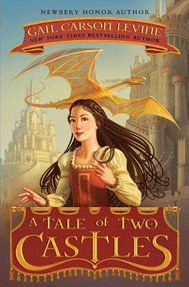Synopsis: Spoiled, beautiful, and orphaned fourteen-year-old Eugenie de Boncoeur is accustomed to outrageous privilege. The French Revolution may rage around her, but Eugenie is far more interested in her over-the-top life of fancy parties, gorgeous dresses, and doting governesses. What Eugenie doesn't know is that her guardian has promised her in marriage to a wealthy revolutionary. Called Le Fantome for his ghostly white skin and chilling manner, he has long nursed a secret grudge against her family.
As the Revolution becomes increasingly violent, Eugenie dusts off her lightly used brains and rises to the challenge of survival. Soon she is in the thick of turmoil and romance, discovering shocking secrets and surprising loyalties in her desperate quest to get out of France alive. But wherever Eugenie goes, the pale assassin is never far away . . .
Review: The first thing that I must assure Readers is that Eugenie is not nearly as annoying as the synopsis makes her out to be. Eugenie certainly isn't my favorite heroine. I would not call her resourceful, practical, or even especially clever. But she really doesn't complain often, she tries to have original and successful ideas, she grows to understand that the political upheavel in France is important and that she cannot ignore it, and she is not scornful of the lower class. She's just young and hasn't had to work for anything. She still possesses a great innocence, which is probably realistic for a fourteen-year-old aristocratic girl.
My main complaint is the story. It takes what seems an unnecessary length of time to get to the storyline concerning Le Fantome, who felt like a minor background character to me. I didn't think him terribly threatening or mysterious; just kind of . . . there. Le Scalpel, his "right-hand man" seems more imposing and someone to avoid than Le Fantome, and I have to say that I liked Le Scalpel and who he ends up being.
I know that The Pale Assassin will have a sequel, and if it doesn't, I will be very much surprised and my opinion of said story will go down, because that is a very sudden place to end it. Despite the fact that it's going to have a sequel, The Pale Assassin doesn't didn't pull me in. The entire time it felt lethargic, probably because Le Fantome had very little to do with the story. The best way I can describe it is it felt like a very long prologue. I hope that the sequel will pick things up. Maybe it will better explain why Patricia Elliott wrote the first book like she did.
Of writing style, I have nothing critical to say, other than the Author didn't seem to quite understand when the work "most" should be interjected and when it should be left out. Just because "most" is put into a sentence doesn't mean it sounds old-fashioned. But other than that, The Pale Assassin was well-written, and I was especially fond of the character Julien.
I am looking forward to seeing what happens next to Eugenie.
Overall Rating: {{{{
Others in the Pimpernelles Series:
1)The Pale Assassin
2)The Traitor's Smile
1)The Pale Assassin
2)The Traitor's Smile







